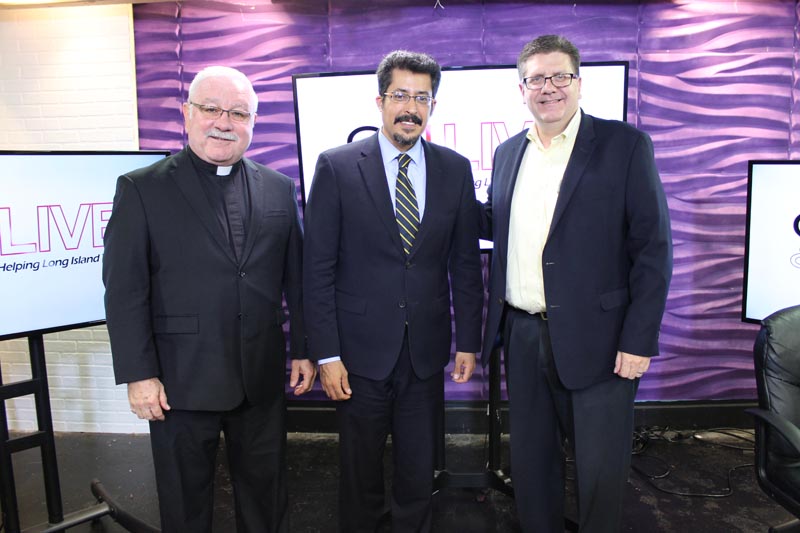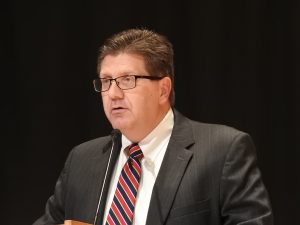 Good afternoon Stony Brook University, my fellow veterans, active-duty service members, families and honored guests. I am truly honored and humbled to have been asked to deliver remarks today at this special celebration. I’d like to dedicate these remarks and my appearance here today to my father, Joe Campolo, Sr. who, unfortunately, and tragically, we lost yesterday. My father would have been here today, in the front row beaming with pride, but instead he now watches us from above, like so many of our fallen brothers and sisters. And while I am heartbroken, his spirit and his work ethic live on inside of me, and so like all our veterans, I shall continue to soldier on.
Good afternoon Stony Brook University, my fellow veterans, active-duty service members, families and honored guests. I am truly honored and humbled to have been asked to deliver remarks today at this special celebration. I’d like to dedicate these remarks and my appearance here today to my father, Joe Campolo, Sr. who, unfortunately, and tragically, we lost yesterday. My father would have been here today, in the front row beaming with pride, but instead he now watches us from above, like so many of our fallen brothers and sisters. And while I am heartbroken, his spirit and his work ethic live on inside of me, and so like all our veterans, I shall continue to soldier on.
Our great country celebrates Veterans Day because, at the 11th hour of the 11th day of the 11th month of 1918, almost exactly 100 years ago, the guns fell silent and the First World War drew to a close. Ever since, Americans have set aside November 11th to honor our veterans because it is our veterans, as we were reminded by President George H.W. Bush, “whose footsteps set the pace of freedom’s march.” American veterans of all generations have a common bond, in that they give their all whenever tyrants and despots seek to imperil freedom and democracy. And while we celebrate our veterans today, we must all ensure that our obligations to them do not end when November 11 turns into November 12.
So, how did I get here?
In October 1983, two trucks carrying heavy explosives struck buildings in Beirut that were housing American and French servicemembers. The first truck bomb detonated at the barracks for the 1st Battalion, 8th Marines, killing 220 Marines, 18 sailors, and three soldiers. It was the deadliest single-day death toll for the United States Marine Corps since World War II, the deadliest single-day death toll for the United States Armed Forces since the Vietnam War, and the deadliest terrorist attack on American citizens overseas. Watching this horrific story unfold, although I was only 15 years old, I knew that evil was among us, and I felt my calling to serve our nation.
I finished high school, and on December 9, 1985, at 17 years old, I boarded a plane for the first time in my life and headed to Parris Island, South Carolina, for Marine Corps recruit training. I loved being a Marine, and did well, graduating first in my platoon and serving as the honor guard at our graduation. I can remember everything about that graduation ceremony – it was a crisp March morning, and although hundreds of people were in attendance there was a deafening silence as we marched out to the parade deck in unison, the only noise being the quiet cadence from our Senior Drill Instructor of “left, left, left right left” and the snap and pop of our heels and rifles when we reached our spot. It was at that moment, when the band started to play the national anthem, that I realized the overwhelming importance, responsibility, and pride that came with being a member of the armed service.
I went on to serve in the infantry at Camp Pendleton, California with the First Marine Division, Fifth Marine Regiment, the most decorated regiment in the Marine Corps. I served as a non-commissioned officer under Lt. Colonel Creed and Sgt. Major McGowan in the first battalion, and our motto and our mantra was “Make Peace or Die.”
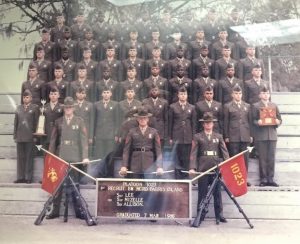 I served honorably, from 1985 to 1989, a four-year period that although was free from armed conflict, was not free from war. Those years were the height of the Cold War, an incredibly tense period whereby President Reagan played an extreme game of chicken with the Soviet Union, who had invaded and occupied Afghanistan. Our unit was placed on high-alert, constantly getting prepared to leave for battle, knowing that if the President could not bluff the Russians into retreat, it would be up to us as the “first to fight” to kick them out. President Reagan’s tactics won, and in May 1988 Russia pulled out of Afghanistan; I can vividly remember the immense feeling of relief we all felt watching those Russian tanks retreat over that bridge. It was then that I realized the wisdom of our mantra, make peace or die, and how important a healthy and vibrant American military is to making sure that the global balance of power remains in check. As Colin Powell has poignantly observed, “We veterans know better than most that the continued strength of America’s military is essential to maintaining the world peace.”
I served honorably, from 1985 to 1989, a four-year period that although was free from armed conflict, was not free from war. Those years were the height of the Cold War, an incredibly tense period whereby President Reagan played an extreme game of chicken with the Soviet Union, who had invaded and occupied Afghanistan. Our unit was placed on high-alert, constantly getting prepared to leave for battle, knowing that if the President could not bluff the Russians into retreat, it would be up to us as the “first to fight” to kick them out. President Reagan’s tactics won, and in May 1988 Russia pulled out of Afghanistan; I can vividly remember the immense feeling of relief we all felt watching those Russian tanks retreat over that bridge. It was then that I realized the wisdom of our mantra, make peace or die, and how important a healthy and vibrant American military is to making sure that the global balance of power remains in check. As Colin Powell has poignantly observed, “We veterans know better than most that the continued strength of America’s military is essential to maintaining the world peace.”
I also learned another important lesson during that period, the lesson of sacrifice and loss. You see, the reason that the United States military is such a great threat and deterrent is because they train every single day as if they are in a life or death situation, and while that training strengthens the fortitude and skill of the young men and women, it often comes with a cost. During one of our training exercises, in Pohang, Korea, we were simulating a helicopter evacuation from a mountainous region – several CH-53s were in a Landing Zone and we all had to traverse difficult terrain to reach them so we could evacuate. I was lucky – I got on the right one – but my dear friends from Charlie Company were not so lucky. I can vividly remember watching their helicopter go down, the flames and billows of smoke, and their screams of horror as it burned. We lost 18 of our Marine brothers and a Navy corpsman that day, March 20, 1989, a day that served and continues to serve as a harsh reminder of the risk and sacrifice that all our veteran brothers and sisters take every day when they put on their uniform.
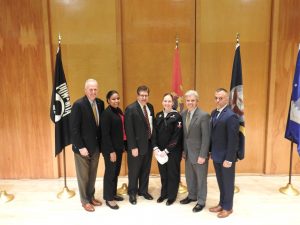 After serving my country, I came home and attended Stony Brook University on the GI Bill. I’m not sure that the enormous impact of the GI Bill is truly understood or appreciated. Signed into law by President Franklin Delano Roosevelt in 1944, the GI Bill was designed to provide a range of benefits for returning World War II veterans including tuition payments, living expenses, mortgages, and business loans. I didn’t come from a wealthy family and I relied on the GI Bill as my golden ticket to a world-class education. The opportunity and education I received here at Stony Brook continued to help shape my life toward one of leadership and service. I then went on to Fordham Law School and as a lawyer I continue to adhere to the sacred vow I took as a young Marine to uphold and defend our constitution.
After serving my country, I came home and attended Stony Brook University on the GI Bill. I’m not sure that the enormous impact of the GI Bill is truly understood or appreciated. Signed into law by President Franklin Delano Roosevelt in 1944, the GI Bill was designed to provide a range of benefits for returning World War II veterans including tuition payments, living expenses, mortgages, and business loans. I didn’t come from a wealthy family and I relied on the GI Bill as my golden ticket to a world-class education. The opportunity and education I received here at Stony Brook continued to help shape my life toward one of leadership and service. I then went on to Fordham Law School and as a lawyer I continue to adhere to the sacred vow I took as a young Marine to uphold and defend our constitution.
For veterans, we understand that swearing to protect and serve our country, with our life if necessary, is a unique experience that unites us and our families. Vice President Cheney once observed that “military service demands a special kind of sacrifice…and those duties are shared by family members who make many sacrifices of their own. Military service brings the pride of developing one’s character and becoming a leader, serving a cause far greater than any self-interest and knowing that our nation’s cause is the best hope of the world. This is a legacy to be proud of, and those who contributed to it must never be taken for granted.”
This day, however, is not only about gratitude for our veterans, but is also a reminder of all that they still have to give our nation, and our duty as citizens to support them. Over a million men and women have completed their military service and rejoined civilian life in recent years. Each veteran has his or her own unique experience, and the community of veterans is constantly evolving. To serve this diverse and skilled community, we must invest in them after their service and support them in every way we can.
 Today’s ceremony and the fanfare of Veterans Day will be meaningless if afterward we do not unite and help provide these returning veterans with jobs and opportunities. And why shouldn’t we? I can think of no one with more experience in leadership, teamwork, selflessness, and bravery than a veteran. Business owners love to complain about millennials and not being able to find the right people to join their team. I’ll tell you this today: veterans know how to get the job done. We as the business community have an obligation to hire, train, and support veterans. As President Reagan said, “We see these men and women and know how much we owe them, how much they have given us, and how much we can never fully repay.” We must, however, try.
Today’s ceremony and the fanfare of Veterans Day will be meaningless if afterward we do not unite and help provide these returning veterans with jobs and opportunities. And why shouldn’t we? I can think of no one with more experience in leadership, teamwork, selflessness, and bravery than a veteran. Business owners love to complain about millennials and not being able to find the right people to join their team. I’ll tell you this today: veterans know how to get the job done. We as the business community have an obligation to hire, train, and support veterans. As President Reagan said, “We see these men and women and know how much we owe them, how much they have given us, and how much we can never fully repay.” We must, however, try.
Supporting veterans has become a cornerstone of my own personal philosophy and philanthropic efforts. In 2018, our firm’s philanthropic arm, CMM Cares, chose two veterans’ organizations to support. First, we partnered with United Veterans Beacon House, an organization that provides housing to military veterans and their families. Our firm purchased furniture, landscaping, decks and barbeques and our team painted, sanded, and spruced up two veterans’ homes owned by Beacon House on the South Shore, giving the residents homes they can feel proud of. We’re also supporting America’s VetDogs, a nonprofit associated with the Guide Dog Foundation for the Blind. Their amazing service dog programs provide enhanced mobility and renewed independence to veterans, active-duty service members, and first responders with disabilities, allowing them to live with pride and self-reliance.
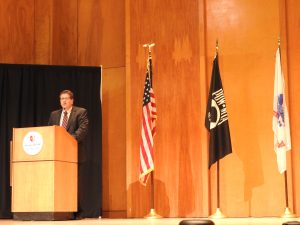 We also seek to employ veterans, and our work to honor them is especially meaningful this year as we salute Jack Harrington, our CMM colleague and friend who, as a Lieutenant in the U.S. Navy Reserve, was deployed to Afghanistan in September. His wife, Sarah, is here today. They are parents of two beautiful young boys. Their family has made incredible sacrifices, and we are very proud of all of them. We miss you, Jack, and we look forward to your safe return.
We also seek to employ veterans, and our work to honor them is especially meaningful this year as we salute Jack Harrington, our CMM colleague and friend who, as a Lieutenant in the U.S. Navy Reserve, was deployed to Afghanistan in September. His wife, Sarah, is here today. They are parents of two beautiful young boys. Their family has made incredible sacrifices, and we are very proud of all of them. We miss you, Jack, and we look forward to your safe return.
In closing, I would like to echo the words of President Reagan, a great unifier who once reminded us that “the United States stands as a beacon of liberty and democratic strength before the community of nations. We are resolved to stand firm against those who would destroy the freedoms we cherish. We are determined to achieve an enduring peace—a peace with liberty and with honor. This determination, this resolve, simply cannot be achieved without those who serve our great nation.”
Thank you all, God bless our veterans, their families, and the United States of America.
Watch Joe’s remarks here.

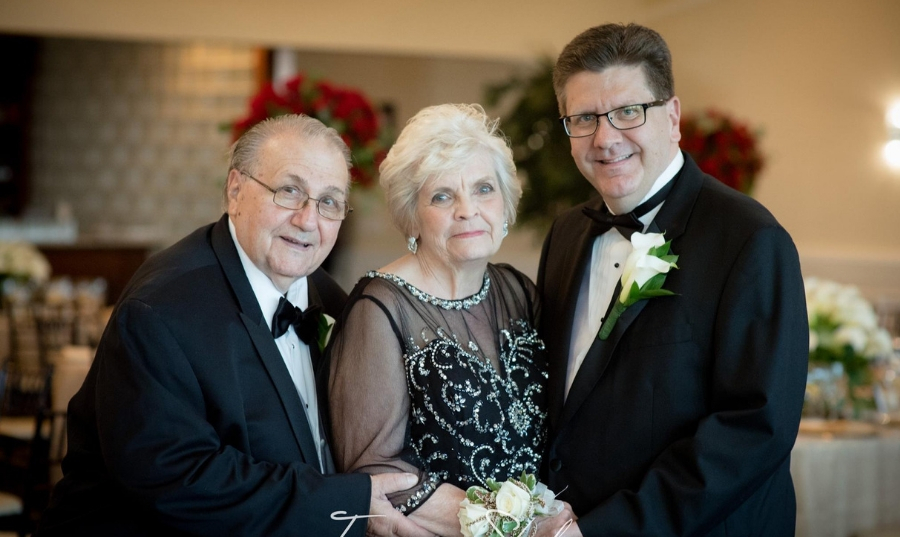
 Good afternoon Stony Brook University, my fellow veterans, active-duty service members, families and honored guests. I am truly honored and humbled to have been asked to deliver remarks today at this special celebration. I’d like to dedicate these remarks and my appearance here today to my father, Joe Campolo, Sr. who, unfortunately, and tragically, we lost yesterday. My father would have been here today, in the front row beaming with pride, but instead he now watches us from above, like so many of our fallen brothers and sisters. And while I am heartbroken, his spirit and his work ethic live on inside of me, and so like all our veterans, I shall continue to soldier on.
Good afternoon Stony Brook University, my fellow veterans, active-duty service members, families and honored guests. I am truly honored and humbled to have been asked to deliver remarks today at this special celebration. I’d like to dedicate these remarks and my appearance here today to my father, Joe Campolo, Sr. who, unfortunately, and tragically, we lost yesterday. My father would have been here today, in the front row beaming with pride, but instead he now watches us from above, like so many of our fallen brothers and sisters. And while I am heartbroken, his spirit and his work ethic live on inside of me, and so like all our veterans, I shall continue to soldier on. I served honorably, from 1985 to 1989, a four-year period that although was free from armed conflict, was not free from war. Those years were the height of the Cold War, an incredibly tense period whereby President Reagan played an extreme game of chicken with the Soviet Union, who had invaded and occupied Afghanistan. Our unit was placed on high-alert, constantly getting prepared to leave for battle, knowing that if the President could not bluff the Russians into retreat, it would be up to us as the “first to fight” to kick them out. President Reagan’s tactics won, and in May 1988 Russia pulled out of Afghanistan; I can vividly remember the immense feeling of relief we all felt watching those Russian tanks retreat over that bridge. It was then that I realized the wisdom of our mantra, make peace or die, and how important a healthy and vibrant American military is to making sure that the global balance of power remains in check. As Colin Powell has poignantly observed, “We veterans know better than most that the continued strength of America’s military is essential to maintaining the world peace.”
I served honorably, from 1985 to 1989, a four-year period that although was free from armed conflict, was not free from war. Those years were the height of the Cold War, an incredibly tense period whereby President Reagan played an extreme game of chicken with the Soviet Union, who had invaded and occupied Afghanistan. Our unit was placed on high-alert, constantly getting prepared to leave for battle, knowing that if the President could not bluff the Russians into retreat, it would be up to us as the “first to fight” to kick them out. President Reagan’s tactics won, and in May 1988 Russia pulled out of Afghanistan; I can vividly remember the immense feeling of relief we all felt watching those Russian tanks retreat over that bridge. It was then that I realized the wisdom of our mantra, make peace or die, and how important a healthy and vibrant American military is to making sure that the global balance of power remains in check. As Colin Powell has poignantly observed, “We veterans know better than most that the continued strength of America’s military is essential to maintaining the world peace.” After serving my country, I came home and attended Stony Brook University on the GI Bill. I’m not sure that the enormous impact of the GI Bill is truly understood or appreciated. Signed into law by President Franklin Delano Roosevelt in 1944, the GI Bill was designed to provide a range of benefits for returning World War II veterans including tuition payments, living expenses, mortgages, and business loans. I didn’t come from a wealthy family and I relied on the GI Bill as my golden ticket to a world-class education. The opportunity and education I received here at Stony Brook continued to help shape my life toward one of leadership and service. I then went on to Fordham Law School and as a lawyer I continue to adhere to the sacred vow I took as a young Marine to uphold and defend our constitution.
After serving my country, I came home and attended Stony Brook University on the GI Bill. I’m not sure that the enormous impact of the GI Bill is truly understood or appreciated. Signed into law by President Franklin Delano Roosevelt in 1944, the GI Bill was designed to provide a range of benefits for returning World War II veterans including tuition payments, living expenses, mortgages, and business loans. I didn’t come from a wealthy family and I relied on the GI Bill as my golden ticket to a world-class education. The opportunity and education I received here at Stony Brook continued to help shape my life toward one of leadership and service. I then went on to Fordham Law School and as a lawyer I continue to adhere to the sacred vow I took as a young Marine to uphold and defend our constitution. Today’s ceremony and the fanfare of Veterans Day will be meaningless if afterward we do not unite and help provide these returning veterans with jobs and opportunities. And why shouldn’t we? I can think of no one with more experience in leadership, teamwork, selflessness, and bravery than a veteran. Business owners love to complain about millennials and not being able to find the right people to join their team. I’ll tell you this today: veterans know how to get the job done. We as the business community have an obligation to hire, train, and support veterans. As President Reagan said, “We see these men and women and know how much we owe them, how much they have given us, and how much we can never fully repay.” We must, however, try.
Today’s ceremony and the fanfare of Veterans Day will be meaningless if afterward we do not unite and help provide these returning veterans with jobs and opportunities. And why shouldn’t we? I can think of no one with more experience in leadership, teamwork, selflessness, and bravery than a veteran. Business owners love to complain about millennials and not being able to find the right people to join their team. I’ll tell you this today: veterans know how to get the job done. We as the business community have an obligation to hire, train, and support veterans. As President Reagan said, “We see these men and women and know how much we owe them, how much they have given us, and how much we can never fully repay.” We must, however, try. We also seek to employ veterans, and our work to honor them is especially meaningful this year as we salute Jack Harrington, our CMM colleague and friend who, as a Lieutenant in the U.S. Navy Reserve, was deployed to Afghanistan in September. His wife, Sarah, is here today. They are parents of two beautiful young boys. Their family has made incredible sacrifices, and we are very proud of all of them. We miss you, Jack, and we look forward to your safe return.
We also seek to employ veterans, and our work to honor them is especially meaningful this year as we salute Jack Harrington, our CMM colleague and friend who, as a Lieutenant in the U.S. Navy Reserve, was deployed to Afghanistan in September. His wife, Sarah, is here today. They are parents of two beautiful young boys. Their family has made incredible sacrifices, and we are very proud of all of them. We miss you, Jack, and we look forward to your safe return.




